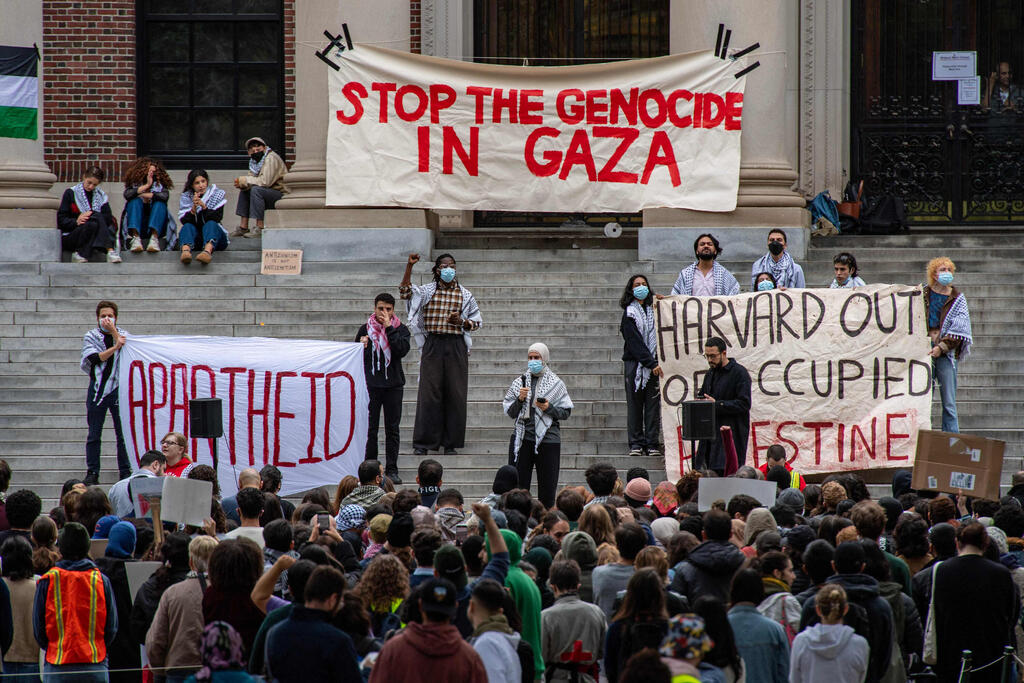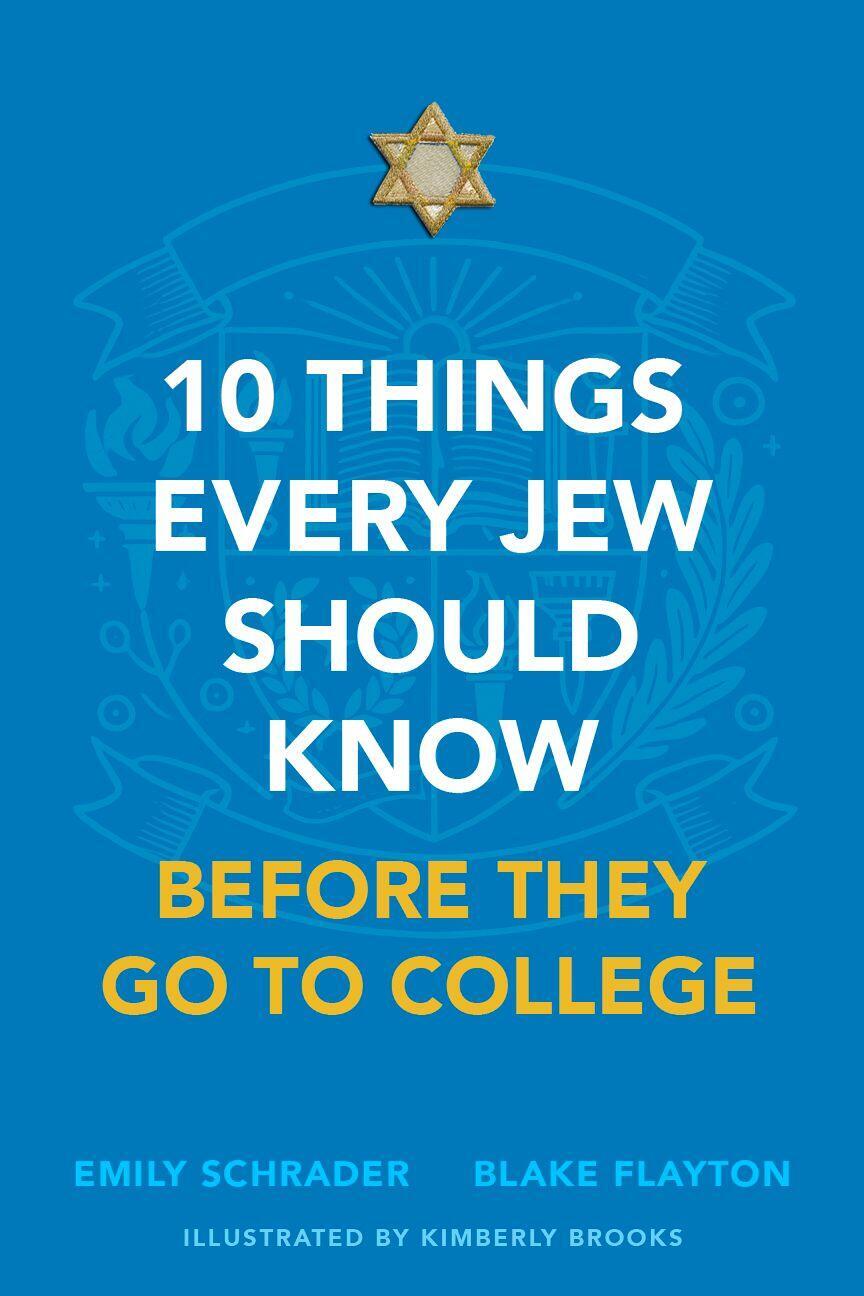Blake Flayton felt the hate on U.S. college campuses long before the war in Gaza. In 2019, he wrote an op-ed for The New York Times, describing how a young, Jewish, liberal, progressive, gay man who supports human and minority rights and is willing to march in any protest for justice and equality finds himself excluded from that camp — simply because he also supports Israel and Zionism.
The widely discussed op-ed made little impact on his campus at George Washington University, nor on campuses across the U.S., as the situation has only worsened over the years, peaking with riots and waves of antisemitism following the October 7 terror attack.
Now 24, and after making aliyah two years ago, Flayton is fighting back. Alongside journalist and advocacy expert Emily Schrader, he has authored a book titled 10 Things Every Jew Should Know Before They Go to College, published by Griffith Moon Publishing.
"It is a guidebook on how to push back against the antisemitism that we have seen explode in the Diaspora since 2021—since Guardian of the Walls, since Israel's last operation in Gaza. And it doesn’t only include information about UNRWA, the United Nations, the conflict and Israeli history — it also has a good amount of information about Jewish culture, Jewish identity, Jewish peoplehood — things that really help to build a Jewish identity, rather than just focusing on the people who behave antagonistically toward us," he says.
“I think it's necessary at this particular time because people need a knowledge base — a kind of instruction manual — for how to interpret the things that Israel and Jews who support Israel are being accused of and how to respond."
Do you provide only information and facts, or do you also offer specific responses to accusations like occupation and genocide?
"Absolutely, we have plenty of answers in there. We have a whole section on antisemitic lies and misconceptions — what they mean, why they’re false and how to respond. Here’s all the evidence you need to prove they’re incorrect, and here’s how to respond to them. That’s very necessary. Wow, I wish that somebody had given me something like that when I was in college."
Pro-Palestinian demonstration at Columbia University
(Video: Reuters)
Do you expect every Jewish student to actively fight antisemitism on campus? Many just want to focus on their studies and enjoy student life without being drawn into the Middle East conflict.
“That’s a big part of the book as well. You are not required to do any of this. There are great ways to connect with Jewish life on campus if the BDS town hall, where everyone is screaming at each other, isn’t for you—because trust me, that can be a very upsetting experience. There are many ways for you to feel in touch with the Jewish community on campus without doing so many things, like getting involved with Hillel, Chabad and other non-political Jewish organizations that are centered around communal life. There are different ways to channel that energy and make a good experience out of it.
“Not everyone is expected to challenge Students for Justice in Palestine or Jewish Voice for Peace with a bullhorn. But for those brave souls who are, we encourage them. We want them on the front line, and this book is here to give them more resources.
Get the Ynetnews app on your smartphone: Google Play: https://bit.ly/4eJ37pE | Apple App Store: https://bit.ly/3ZL7iNv
“That said, it’s worth taking a stand on campus. College isn’t everything. I know for college students, it can feel like your entire world — who your friends are and who you associate with seems to define your life and happiness. But you will graduate. You will leave campus. And if people are saying horrible things about Jews and Israel, it does pay off to confront them and tell them no — even if you lose friends or opportunities. Because lies should be confronted when they’re spoken — and I believe that for a lot of different spaces, not just Jewish students on the college campus.”
Directly confronting false claims
One of the most common arguments Israelis use against their critics — particularly from the left and on college campuses — is hypocrisy. Many who single out Israel and protest against it completely ignore other global conflicts, accusing Israel of apartheid and discrimination against minorities, while human rights conditions across much of the Arab world are significantly worse.
More specifically, a widely used Israeli rebuttal to LGBTQ+ organizations that criticize Israel is the claim that "Hamas would throw you off rooftops in Gaza." It is often pointed out that these activists support a group that is explicitly far worse in its treatment of the LGBTQ+ community. Even Prime Minister Benjamin Netanyahu used a similar analogy in his speech to the U.S. Congress, comparing LGBTQ+ support for Hamas and the Palestinian cause to chickens supporting KFC.
However, Flayton argues that Israelis are completely missing the point — and that comparisons to Hamas or other countries are irrelevant.
“LGBT young people in America have been indoctrinated with far-left ideology and told that if they do not subscribe to this anti-American, anti-Western, anti-capitalist worldview — as much as an 18-year-old even understands capitalism and communism — then they are not officially welcome in the LGBT community," he says.
“When they criticize you, the focus needs to always be on the Jewish story — the justness of Zionism, what we’ve achieved in the last century and the fundamentals of our culture and peoplehood—rather than constantly trying to disparage our enemies. I’m not saying that’s a naive or foolish strategy, but it doesn’t work. The indoctrination runs too deep. The solution, I think, is to broadcast the Jewish story—our history as a people, and the different varieties of Jews: religious, non-religious, left, right, Ashkenazi, Sephardi, Mizrahi, etc. All the different types of people that live in Israel and in the Diaspora. I don’t even think teaching about the Holocaust helps because it’s sort of victimizing us rather than broadcasting what we have to offer the world and what we have accomplished.”
Fighting for democracy in Israel as well
Recently, Flayton shared his story as part of a "human library" featuring accounts from immigrants around the world. The event, held at ANU – Museum of the Jewish People in collaboration with Nefesh B’Nefesh, marked National Aliyah Day, which honors and appreciates the contributions of immigrants to Israel.
Flayton, who grew up in a Reform Jewish household and describes himself as entirely secular, made Aliyah in 2022 to deepen his connection to his Jewish identity by living in the Jewish state.
Over the past two years, he has experienced the Israeli rollercoaster — a year of mass protests over judicial reforms and deep societal divisions, followed by October 7, 2023, and a war that is still ongoing.
Despite being in Israel during this time, Flayton closely followed events on U.S. campuses, which he says mirrored what he had already felt years ago — only at a much higher intensity.
"The war is just an excuse to repackage the same accusations that have been used against Israel for decades," he says. "It’s just an excuse to recharge the attacks — they get louder when something is actually going on. But the anti-Israel activists in the West don’t need something going on in the Middle East to engage in this behavior."
Hypothetically, if a regional peace agreement were signed tomorrow and all wars ended, do you think Israel would be more accepted in these circles?
"There’s actually some reason to assume that it would get worse. Evidence suggests that this really started to become a problem in the Diaspora, particularly in academic circles, during the Oslo peace process—the very moment when Israel was extending itself the most to make peace and reconciliation with the Palestinians. At least in the United States and Europe, if not earlier, anti-Israel activism on campuses became the loudest just as sentiment toward Israel was moderating, with some beginning to see it as a force for good. They couldn’t have that, so they ramped up their activities—including organizations like Students for Justice in Palestine.
 Emily SchraderPhoto: Shay Franko
Emily SchraderPhoto: Shay Franko"For decades, people have accused Israel of every evil under the sun, and by extension, Jews who support Israel have faced the same accusations — genocide, apartheid, racism, colonialism, ethnic cleansing. The word genocide was being used long before October 7 and the current war, so nobody should be shocked that it has gotten so popular now. The ground had been softened for so long for this type of situation—where Jewish people feel like they’re being thrown out of their universities and pushed out of their social circles, places where they were once comfortable, if not celebrated. This has been years in the making—Israel has been this point of accusation in progressive circles. In the end, it doesn’t matter what Israel does—as long as the hard left in these circles needs that point of accusation to deflect blame away from their own failures or those of other countries and societies, this is going to continue."







